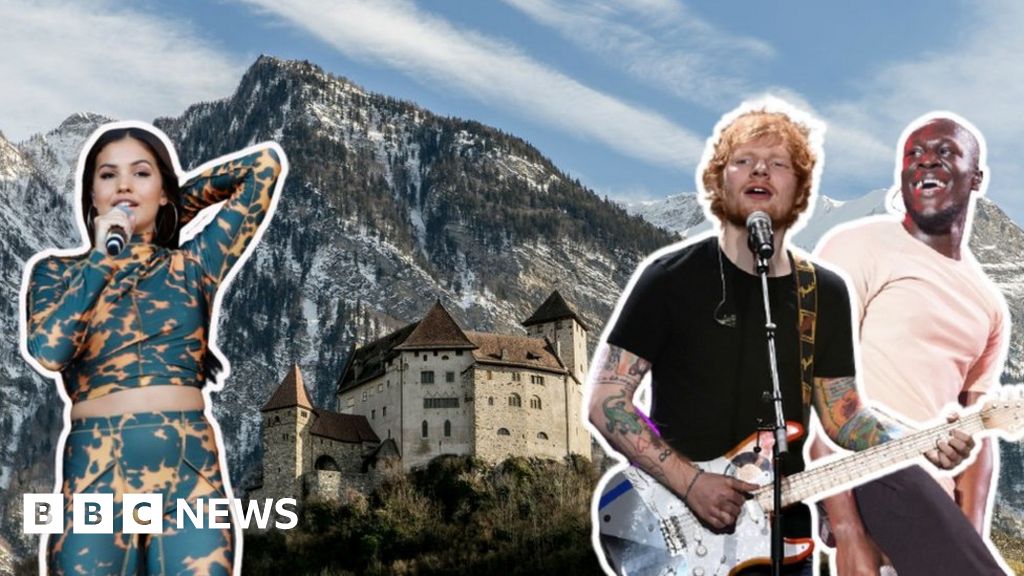Getty Images
Pop stars like Mabel, Ed Sheeran and Stormzy can play Liechtenstein without obtaining expensive work permits
On Friday, Culture Secretary Oliver Dowden announced that a new frontier had been opened for British musicians who want to play live in Europe.
Thanks to “ambitious” negotiations, he said, artists and their crews can now tour without visa requirements in Norway, Iceland and Liechtenstein.
The deal comes after Brexit meant performers must obtain costly permits to play in many European countries.
But touring musicians called Dowden’s announcement “tragic” and “a joke”.
He added: “The Charlatans have played all over the globe for 31 years and we’ve had three number one albums. However, Oliver Dowden, we have never played in Iceland or Liechtenstein due to sheer expense/very small populations there and few venues or promoters. But thanks for your help.”
However, the UK government pointed out that the deal with Iceland, Norway and Liechtenstein – which are not part of the EU, but are in the European Economic Area – was only one part of an overall effort to reopen Europe to British musicians.
It added that the arrangement was based on the same UK offer that the EU turned down during Brexit negotiations last year.
Who actually plays in Liechtenstein?
Charlatans singer Tim Burgess (left) was among those who criticised Oliver Dowden’s announcement
Of the UK’s top 10 touring artists, none have played in Liechtenstein in the past decade.
Only one act – Ed Sheeran – has visited Iceland since 2011, but Norway remains a regular touring stop for most bands on the European touring circuit.
Up-and-coming stars often include Iceland in their itineraries too, with the likes of Georgia and Not3s playing the Iceland Airwaves festival in recent years.
We could only find evidence of a handful of British artists travelling to Liechtenstein over the last decade – with Status Quo, Welsh rock act Skindred and drummer Simon Phillips among those to have played there.
One roadie tweeted Mr Dowden to say: “In 22 years of touring I have worked 5 gigs in Norway, 2 gigs in Iceland and *checks notes* 0 gigs in Liechtenstein.”
UK Music’s chief executive Jamie Njoku-Goodwin was among those who welcomed the deal.
While cautioning that “we have yet to see the final details”, he said: “If the UK can reach agreements to allow musicians and crew to tour these countries, it can reach similar deals with EU members.”
However, the Carry on Touring Campaign said Mr Dowden’s announcement “is simply not ambitious enough”.
“It seems crazy that, given the UK’s creative industries are such a massive success and contribute around £111.7bn to the economy, the government isn’t working harder to sort this mess out,” said campaign director Tim Brennan.
Tours cancelled?
Pressure has been mounting on the government to cut the red tape holding back musicians who want to tour the EU post-Brexit.
Under the terms of the deal, British bands can tour Europe for up to 90 days in a 180-day period. But shows in Portugal and Spain, for instance, will now require extra visas for paid work, while those in France and The Netherlands will not.
Transporting stage equipment and instruments across borders may also incur extra fees.
Stars including Sheeran, Sir Elton John, Nicola Benedetti, Liam Gallagher, Radiohead and Judith Weir, Master of the Queen’s Music, wrote to the government demanding action on the issue in January.
A month later, a House of Commons survey of musicians who had signed a petition calling for visa-free touring found that 81% of respondents said they were now likely to stop touring Europe.
The new rules could make it harder for British bands to play at European festivals like Spain’s Benicassim
Non-musical performers are affected too. The National Theatre has shelved plans to tour Europe due to uncertainty over obtaining visas, and actors including Sir Ian McKellen and Dame Julie Walters have urged Prime Minister Boris Johnson to intervene.
In February, Mr Dowden laid the blame with the EU, calling the restrictions on musicians “absurd and self-defeating”. The EU insisted it was the UK government that was at fault, saying ministers had rejected plans to allow journalists, performers and musicians a greater degree of freedom when working in the bloc.
Speaking to MPs in May, Mr Dowden revealed he had spoken to every EU member state since January, and that the picture now seemed “much more positive” than was first thought.
Allow Twitter content?This article contains content provided by Twitter. We ask for your permission before anything is loaded, as they may be using cookies and other technologies. You may want to read and before accepting. To view this content choose ‘accept and continue’.
Accept and continue
“We want musicians and others to be able to tour easily both inside and outside the EU,” a UK government spokesperson told the BBC on Tuesday.
“Short-term, temporary visits for paid performances by UK musicians are possible in at least 17 EU countries, including France, Germany and the Netherlands, without needing visas or work permits.
“We have engaged with every EU member state to clarify their rules for touring and are working closely with them and the sector to see what further support we can provide.”
Further information may come to light later this week when the House of Commons digital, culture, media and sport select committee questions Brexit Minister Lord Frost about the issue.
Source link : https://www.bbc.com/news/entertainment-arts-57387840
Author :
Publish date : 2021-06-08 07:00:00
Copyright for syndicated content belongs to the linked Source.
